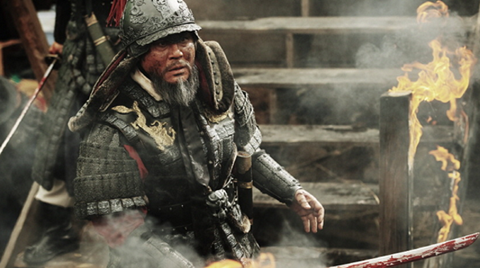Dir/scr: Kim Han-min. South Korea. 2014. 128mins

Having broken almost every box office record in its path, South Korean historical naval epic Roaring Currents, that depicts the famous Battle of Myeongnyang in 1597 where Admiral Yi Sun-shin led 12 boats to victory against a Japanese fleet consisting of over 300 vessels, has been a gargantuan hit with local audiences, generating a whopping $64.3 million dollars in just ten days. But given the film’s nationalistic tone and its many caricatures, it’s unlikely to resonate as well with international audiences who by in large will be unfamiliar with the Korean legend.
One of Korea’s most prolific actors Choi Min-sik (Oldboy) doesn’t necessarily do anything wrong playing the legendary admiral, but his presence feels somewhat, surprisingly, underwhelming, at least compared to some of his more iconic roles.
Its extraordinary success at home, where it attracted over 3.3 million viewers ($25.8m) on its opening weekend, crushing a record held by Transformers: Dark Of The Moon (2.3 million admissions; $22.4m) is in part due to the fact that the film succeeds in portraying Yi Sun-shin who is known to all Koreans as a hero along with the battle itself in a manner audiences have responded well to, but external circumstances too such as the poor diplomatic relations between Japan and Korea, as well as the Sewol ferry sinking in April that caused widespread despondency have perhaps been a factor in how audiences have responded to the naval epic.
The film, which goes on release in North America under the title: The Admiral: Roaring Currents on August 8 in Los Angeles and then expands to 30 cinemas on August 15 through CJ E&M America will likely have a harder time finding an audience, but the film’s unprecedented success in Korea along with Choi Min-sik’s leading presence who is also experiencing success Stateside with Luc Besson’s Lucy where he plays the film’s antagonist, should aid in raising awareness of the film’s release.
Set in 1597, the film is set in the sixth year of the Imjin War between the Joseon Dynasty Korea and Japan where Japanese forces are advancing by land and sea towards the Joseon capital. Amidst a fractious political climate, Admiral Yi (Choi Min-sik) is wrongly impeached and tortured following a Japanese double-agent plot, but is hastily reinstated after an incompetent naval commander squanders much of the Joseon navy through ill-conceived tactics.
Left with 12 ships at his command, he leads his fleet against a Japanese armada of some 330 vessels led by General Kurushima (Ryu Seung-ryong) in a battle in the Myeongnyang strait off the southwest point of the Korean peninsula that is dictated more by perceptive and intelligent tactics than by firepower.
Director Kim Han-min whose filmography includes the period-action box office hit War Of The Arrows (2011) spends an hour setting the stage for the battle without any meaningful development in both the plot and characterisations, while the second half, fortunately, does kick into gear when the canon’s start firing and Yi’s ingenious tactics get the big screen treatment, but the overstated costumes worn by the Japanese leadership, and the almost cartoonish portrayal of these characters only reinforces the film’s overly patriotic narrative.
Nevertheless, the fact that the Korean film industry can put together a technical team that is able to deliver the necessary spectacle is an achievement in itself. Although the result is far from being reflective of what the industry can produce both on a technical and creative level, the film boasts enough cinematic flare to justify the reported $14.62m (KRW 15 billion) budget, and that has in turn helped attract the masses.
One of Korea’s most prolific actors Choi Min-sik (Oldboy) doesn’t necessarily do anything wrong playing the legendary admiral, but his presence feels somewhat, surprisingly, underwhelming, at least compared to some of his more iconic roles. The same can be said of Ryu Seung-ryong (The Target) who is capable of delivering significantly more as the Japanese general, but ultimately plays more of a supporting role rather than a lead.
Going forward, the film is almost certain to enter the so-called coveted 10 million-ticket club becoming the tenth film to do so, but its biggest test will be whether it can become the most successful Korean film of all time in the domestic box office and surpass Bong Joon-ho’s The Host’s (2006) final tally of 13 million admissions.
Production Company: Bigstone Pictures
International sales: CJ Entertainment, www.cj-entertainment.com
Producers: Kim Han-min, Kim Ju-kyung, Chung Byoung-wook
Co-Producer: Bang Ok-kyung
Associate Producer: Kwon Mi-kyung
Executive Producer: Jeong Tae-sung
Screenplay: Jeon Cheol-hong, Kim Han-min
Cinematography: Kim Tae-sung, Ha Gyeong-ho
Editor: Kim Chang-ju
Production Designer: Jang Chun-sup
Music: Kim Tae-seong
Main cast: Choi Min-sik, Ryu Seung-ryong, Cho Jin-woong, Kim Myung-gon, Jin Goo, Lee Jung-hyun





















